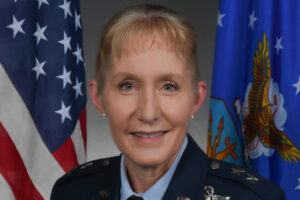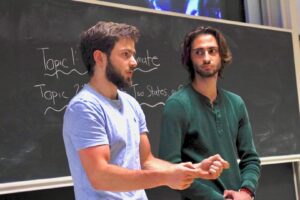A wealth of knowledge and opportunities is available to undergraduates who choose to get involved in cutting-edge research at the university. The Senate of College Councils, which co-sponsors Research Week, is showcasing the work of one undergraduate researcher a month, in this new QandA series appearing on Know.
_________________

Name: Bethany Berkeley Gartin
Year: Graduated December 2011
Academic focus: Licensed Baccalaureate Social Worker
Background: A recent graduate of the School of Social Work, Berkeley Gartin conducted research at the Center for Social Work Research for two years and worked on multiple projects as an undergraduate research assistant. Additionally, Berkeley Gartin worked on an article for the American Journal of Public Health, with Dr. Carol M. Lewis, the associate director for the Center for Social Work Research.
How did you initially get involved in undergraduate research?
I became inspired after taking Social Work Research Methods with Dr. Catherine Cubbin during the spring of 2010. I decided to volunteer on a research project to see if I would be interested in pursuing a research career in the long run. I contacted Dr. Carol M. Lewis at the Center for Social Work Research and started volunteering on the AFL project in February 2010, and was hired as an Undergraduate Research Assistant after several months. Near the end of the project, I was encouraged by others to apply for the undergraduate research fellowship and after the fall semester concluded, I began working on the proposal.
Describe your experience working with Dr. Carol Lewis. How has she inspired you or helped you in your higher learning pursuits?
Dr. Lewis is one of the most inspiring individuals I have ever been given the opportunity to work with. From day one, she was incredibly supportive of my interest in research and provided numerous learning opportunities. She took the time to teach me valuable skills and tools that allowed for steady professional development. She also created challenging and stimulating experiences that enhanced my independent work ethic and responsibility. I admire Dr. Lewis greatly, and can only aspire to achieve what she has in her career thus far — I feel honored to have been given the opportunity to learn from such an amazing and accomplished individual.
Tell us more about your research project. What interested you in understanding and increasing awareness of contraceptive use patterns?
While working as a research assistant with Dr. Carol M. Lewis and Megan Scarborough on the Adolescent Family Life Care Grant Evaluation, I became particularly drawn to the subject. It seemed that most of the research available on adolescent pregnancy had not assessed contraceptive use patterns after the initial pregnancy as potential predictors of rapid repeat births. I had been encouraged to apply for the Undergraduate Research Fellowship and with support, decided to pursue the subject further and examine contraceptive use patterns at a different point in time than had been previously studied in depth.
How has your work in research contributed to an overall enriching academic experience?
Taking time to work on the fellowship, volunteering and working on a couple other research projects kept me very busy — I am a strong believer in demanding schedules playing a role in productivity and motivation. I also found that the challenges provided working on research studies enhanced my ability to think creatively and logically on projects, essays and exams for class. Social work research is incredibly unique and I was able to consistently link research to theory and practice, gain a deeper understanding of Evidence Based Practice and a deeper appreciation for the field of social work through a different lens.
What advice would you give to incoming and current students about getting involved in research?
Do not be afraid to reach out to professors, faculty and research associates to become involved in research. If you think you might be interested in research, try volunteering on a project — the experience is worth the time and effort.
What opportunities have you had to present or publish your research?
I was able to present my research at the Annual Undergraduate Research Bazaar during Research Week 2011. Although not based on my particular study, I worked on an article from the same project data, “Preventing Subsequent Births for Low-income Adolescent Mothers: An Exploratory Investigation of Mediating Factors in Intensive Case Management” with Dr. Carol M. Lewis, Dr. Monica Faulkner and Megan Scarborough at the Center for Social Work Research that has been submitted to the American Journal of Public Health for review and possible publication.
Why do you believe research has played an important role in your undergraduate education?
Research has played an extremely important role in my undergraduate education. In fact, I feel that my time working on research was the most challenging and enlightening and provided the most professional and personal development. Research also became something that defined my undergraduate experience and paved the path for my current career and long-term goals. Additionally, the networking opportunities that were provided were instrumental in maintaining connections with incredible faculty and staff at UT.
Read more stories about undergraduate researchers:
- “Undergraduate research: An eye-opening experience” — November 2011
- “Undergraduate research: Helping define career goals” — October 2011



